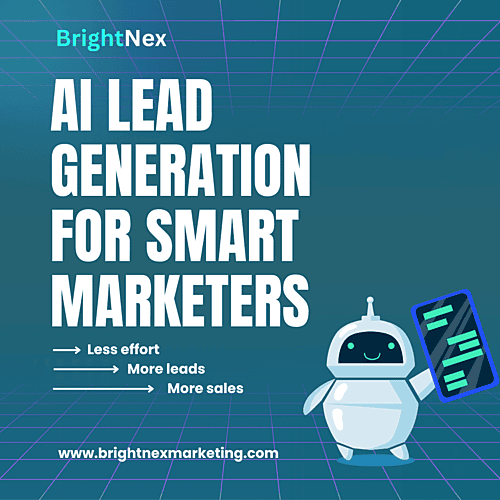Introduction:
In a rapidly evolving digital marketing landscape, AI lead generation is emerging as a game-changer. Businesses are increasingly turning to artificial intelligence to streamline lead acquisition, optimize customer targeting, and boost conversion rates. As we step into a future powered by smart automation, it's essential to understand how AI is reshaping the way we attract and convert leads. This article explores how AI lead generation is becoming smarter, faster, and more profitable—providing marketers with a clear competitive edge.
Why AI Lead Generation Matters in 2025 and Beyond
Traditional lead generation strategies often require significant time, manpower, and financial resources. In contrast, AI lead generation offers a highly efficient, data-driven alternative. With advanced algorithms, machine learning, and predictive analytics, businesses can now identify high-quality leads with minimal effort and maximum accuracy.
AI tools not only collect data but also analyze it to understand patterns, behaviors, and buying signals. This enables businesses to personalize outreach and make data-backed decisions that increase their ROI.
Smarter AI Lead Generation Through Predictive Analytics
One of the standout features of AI is its ability to analyze past data to predict future behavior. This means businesses can focus on prospects most likely to convert, significantly improving sales efficiency.
Key Benefits of Smarter AI Lead Generation:
Targeted Campaigns: AI identifies audience segments with high engagement potential.
Improved Personalization: AI tailors messages based on user behavior and preferences.
Real-Time Insights: Marketers receive instant data feedback to adjust strategies quickly.
By automating repetitive tasks and delivering smarter segmentation, AI lead generation becomes a strategic asset in any marketing toolkit.
Faster Processes with AI-Powered Automation
Speed is crucial in the modern sales funnel. AI eliminates manual bottlenecks by automating the most time-consuming lead generation tasks, including:
Data collection and enrichment
Lead scoring and qualification
Email follow-ups and chatbot engagement
With these processes running in real time, your sales team can respond faster and close more deals—without being bogged down by tedious administrative work.
Example Tools Enhancing Speed in AI Lead Generation:
HubSpot: Uses AI to segment leads and automate follow-ups.
Drift: AI chatbots qualify leads instantly based on predefined criteria.
ZoomInfo: Delivers real-time lead enrichment and intent data.
These tools demonstrate that AI lead generation not only works harder but also works smarter for your sales pipeline.
More Profitable Lead Generation with AI
When you combine smarter targeting with faster automation, the result is higher profitability. AI minimizes ad spend waste by optimizing campaigns in real time and focusing resources on high-converting leads.
How AI Enhances Profitability:
Lower Cost per Lead (CPL): AI prioritizes prospects likely to convert, saving time and ad spend.
Higher Conversion Rates: Personalization and accurate targeting result in better engagement.
Scalability: AI systems can handle massive data volumes, enabling businesses to scale lead gen efforts without increasing costs.
Ultimately, AI lead generation helps businesses spend less while earning more, creating a sustainable and scalable growth engine.
AI Lead Generation in Action: Real-World Applications
From startups to Fortune 500 companies, businesses across all sectors are leveraging AI for lead generation.
E-commerce brands use AI to analyze customer behavior and suggest personalized product recommendations, turning visitors into buyers.
SaaS companies use AI to identify companies showing buying intent based on online activity, making outreach timely and effective.
B2B marketers deploy AI-driven chatbots and content personalization to engage high-value leads around the clock.
These examples show that AI lead generation is not a future concept—it’s already here, delivering results today.
Challenges and Considerations
Despite its many benefits, AI does come with challenges. Businesses must address:
Data Privacy: Ensuring ethical data collection and compliance with GDPR.
Bias in AI Models: Training AI on diverse data to avoid skewed outcomes.
Cost of Implementation: Investing in the right tools and training can be expensive upfront.
That said, the long-term gains of AI lead generation far outweigh these initial hurdles when approached strategically.
What’s Next for AI Lead Generation?
As AI technology continues to evolve, we can expect even more sophisticated lead generation capabilities:
Voice AI & Conversational Marketing: Smart assistants like Alexa and Siri will play a role in future lead nurturing.
Deeper Personalization: AI will go beyond names to understand context, tone, and emotions in communications.
Hyper-Automation: Integration of AI with other systems like CRMs and analytics tools will allow seamless, end-to-end automation.
The future of AI lead generation looks bright, empowering businesses to connect with customers in meaningful and efficient ways.
Conclusion
The evolution of AI lead generation is transforming the way businesses attract, engage, and convert leads. It’s not just about speed or efficiency—it’s about making smarter decisions that drive better outcomes. As the technology matures, adopting AI for lead generation isn’t just a competitive advantage—it’s becoming a necessity. Whether you're a startup or an enterprise, now is the time to embrace AI-powered solutions to stay ahead of the curve.


